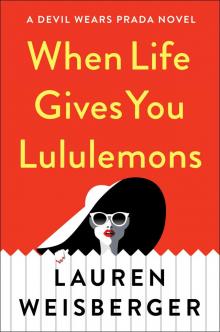- Home
- Lauren Weisberger
When Life Gives You Lululemons Page 27
When Life Gives You Lululemons Read online
Page 27
Miriam expected he had changed the password to his computer, so she was surprised that their shared password logged her right in. She nosed around a little, scanning his inbox, outbox, and trash for anything unusual, but nothing stood out. She hit up his iPhoto. Nothing. There was a folder ominously named PRIVATE in his Dropbox, but inside were only copies of the family’s passports, Social Security cards, credit cards, and driver’s licenses. Twenty minutes into her little search, and Miriam was feeling guiltier by the minute for invading his privacy like this, but the palpable relief she felt was worth it. She jumped a little when the computer dinged and a new email came in. It was from American Express, and it included his June credit card statement, along with a confirmation that he’d chosen to go paperless.
Paperless? she wondered, clicking on it. If anything, she and Paul were both extraordinarily anal. They went over their statements with color-coordinated highlighters each month to catch any fraudulent charges before paying them in full and scanning them into both cloud-based and hard-drive filing systems. She couldn’t imagine why he would go paperless if he would end up printing out the statements to review every month anyway. Another click revealed the statement from Paul’s individual card. Each of them maintained a personal credit card and a checking account, since they agreed on the importance of financial freedom and privacy—plus, how would they ever buy each other a gift or a surprise if everything was shared?—but most everything was charged to their shared card and paid for out of joint checking. Aware that she was violating everything they’d agreed on, Miriam clicked open Paul’s statement.
The first dozen charges were typical. Two restaurants they’d visited together. A charge for strawberry picking that weekend they’d taken the kids to a nearby farm. Sunoco, Foot Locker, Jamba Juice, the fish place in town. A charge for having his racket restrung. Thirty dollars at Barnes & Noble when she’d sent him to pick up a last-minute kid-birthday present. The recurring monthly charge for his fancy new gym. The largest single charge, nearly three thousand dollars, was for Delta, and she remembered that it was the plane tickets to Florida they’d bought for the coming Christmas. It was number thirteen that caught her attention, a charge from Lofted, a small, insanely expensive design store on Main Street that Miriam was too intimidated to enter. She’d ogled the gorgeous area rugs and the dramatic lighting fixtures from the street, but each time the imperious owner met her gaze and didn’t offer a smile, Miriam scuttled along. The charge was for eleven hundred dollars, and the only description of the purchase was THROW BLANKET. What the hell was Paul doing buying eleven-hundred-dollar throw blankets at Lofted? As far as she knew, he wasn’t aware the store existed. Was it an impulse purchase, something he’d bought because he could, like the Maserati? She wouldn’t have thought so before, but apparently that was a yes. A super-fancy gym? Again a yes. But still, it seemed impossible that he’d spend over a thousand dollars on a blanket, when Paul was neither remotely interested in home design nor particularly cold. Which meant it was probably a gift.
For whom?
Her birthday wasn’t anytime soon. Paul didn’t usually buy ahead like that, and it wasn’t as though she’d asked for a criminally expensive blanket as her present. Or anything, for that matter. He hadn’t bought his mother a birthday gift since his wedding day, when all gift-buying and thank-you-note-sending responsibilities had instantly become Miriam’s. Gun to her head, she couldn’t think of one person on earth Paul would buy it for. Except the obvious. She’d have to be an absolute moron not to see it. Not to accept it.
She went back to the statement. There were a handful of more ordinary charges, a couple of questionable ones (a hefty charge from Benjamin Moore for primer and paint; an even bigger one for an online framing company), but the very last item took her breath away. Right there, the final charge of the month, on June 30 to Coastal Realty, and again only two menacing words for the description: JULY RENT. $3,300. The address listed was for a management company located in town.
A collage of images flashed through her mind: a love nest, painstakingly painted in Benjamin Moore’s Burnt Ember and Smoked Truffle, adorned with various pillows and blankets and floor cushions to ensure every possible surface was soft enough for the constant, unrelenting sex it hosted. And although she wasn’t a puker—never had been, not through two pregnancies and plenty of questionable street food abroad—without a moment’s warning, Miriam leaned over and vomited directly into Paul’s pristine walnut trash can. She must have passed out right in the chair, because when she next opened her eyes, Paul was staring down at her with a worried expression, his eyes darting between the computer, the barf-filled trash can, and Miriam.
“Miriam, what’s going on? Why are you sleeping in here? Are you sick?”
The taste in her mouth was so repugnant and her tongue so dry that she could only glare at him.
Paul helped her over to his leather man-couch as though she were an elderly patient. The feeling of his warm, capable hand wrapped around her upper arm made her stomach roil again.
“Here, rest,” he said. “I’m going to give the kids some cereal and get them on the bus. I’ll be back in a few minutes, okay?”
Miriam slung her arm over her eyes to block out the light, as though she were suffering from an ordinary hangover instead of realizing that life as she knew it was over. Even this felt strange, the level of drama. Miriam didn’t do drama. She did capable and dependable. She gave the kids well-balanced meals of fruit and yogurt and protein-rich eggs each morning, even when she herself ate donuts. She put on brave fronts when she was tired or upset, firmly convinced that her children didn’t need or deserve to shoulder any of her own adult burdens, and she stuck to a well-worn routine that gave her and her family the kind of predictability and stability they all required in today’s crazy, frenetic world. But collapsed in a heap on her husband’s couch after having great sex with him only to discover that he’d been cheating on her, as she’d suspected? And not just cheating but preparing to leave her by renting and decorating his own apartment? No. This was not her scene. And the longer she lay there, listening to the familiar sounds of her house as Paul scrambled to get all three children dressed, packed, fed, and off to school, the angrier she became. He had done this to her.
Thirty minutes later, when he finally returned from the bus stop, she spat, “How dare you?” The nausea faded. The weak, jittery feeling that had kept her from standing or talking had disappeared. And in its place was cold, hard anger. “How dare you do this to all of us? Because you know what, Paul? That’s the true tragedy here. It’s not just me who has to deal with the fallout of your cheating. Because let me assure you, I will get over it. I will not be a victim. But our children? That’s a different story entirely.”
Paul stared at her, astonished. What? Was he surprised to see the fire in her? Had he started to think of her as a suburban mom who lunches, like all the rest of them? Did he not recall that she had outearned and outperformed him with her superior education and better job right up until he happened to get lucky and win the jackpot?
“Stop looking at me like that and say something,” she said, her tone venomous. “Actually, on second thought, don’t. You know what we’re not going to do right now? We’re not going to sit here for the next two hours with me begging you for every last detail—who is she, how did you meet, how does she like it in bed, is she prettier than me?—and you pleading for my forgiveness. We’re better than that, Paul. Or at least I am. Let’s save ourselves even more heartache and not go there. Go pack a bag and get the hell out of this house, and after we’ve both had some time to think things over, we can have a conversation like rational people.”
“Are you finished?” he asked, his voice quavering.
“Yes.” Although she desperately wanted him to leave so he wouldn’t see her cry, she also secretly hoped he’d do what she had ordered him not to: namely, throw himself at her feet and beg for forgiveness. Announce that he was willing to do anything to save their marr
iage and piece back together their family. She was giving an Oscar-level performance, but underneath the brave exterior, she was terrified.
“I can’t believe what I’m hearing right now,” he said, raking his hair.
“Oh, you can’t believe—”
Paul said firmly, “It took me a minute to figure out what the hell is going on here—or really, what you think is going on here—but I’ve got it now.” He pointed to the computer screen, where his Amex statement was still up. “You see charges you don’t recognize. A rented property you can’t explain. And it’s curious, I get it.”
“Curious? I’m not sure that would be my first choice in words.”
He glared at her with such distaste that it almost took Miriam’s breath away. “Get in the car. Right now.” Paul strode over to the couch and grabbed her wrist. He pulled her up to stand so roughly she yelped. “I mean it, you crazy person. The car. Now.”
Miriam looked down at her vomit-spattered nightshirt. “I’m not even wearing underwear,” she said, motioning to herself.
“You have two minutes. Go throw something on, it doesn’t matter what. I’ll meet you in the garage.”
Her mind was surprisingly blank as she grabbed a pair of ripped jean shorts from the floor and a clean T-shirt. The kitchen looked like a hurricane had blown through it, but Paul was standing in the connecting mudroom, holding open the door to the garage, challenging her to even think of mentioning the mess.
Although she would’ve thought it impossible in light of what had gone down, they rode in absolute silence for ten minutes before Paul pulled into a parking lot. Surrounding it was a two-story building, horseshoe-shaped, with a gray-washed exterior and white wood-framed doors and a shingled roof. It looked like it belonged more in Nantucket than in a suburb of New York. Miriam had driven by it a hundred times but hadn’t really noticed how charming it was.
“Why are we here?” she asked, looking around. On the first floor were a yoga studio, a landscape design firm, and an organic market that advertised a juice bar in the back.
Paul held open a door that read COWORKING SPACE, and she followed him up a staircase to a cheerfully lit waiting area. On the three doors here, she saw signs announcing their occupants as two child psychologists and one speech therapist. Past that area and down the hall were more doors, each adorned with a person’s name, and at the very end of the hallway, a door with no name. Paul typed a four-digit code—their shared ATM pin, she noticed—into the keypad and swung it open. Inside was a small but surprisingly spectacular open-plan office with washed-oak floors and modern but warm furniture: desk, leather swivel chair, bookcases filled with framed family photos and Miriam’s favorite hardcovers and tchotchkes she’d collected from her travels over the years. Best of all, it was filled with the most incredible light, from the two enormous overhead skylights and the back wall of windows that looked out over a small tributary of the Byram River. There was a Juliet balcony that overlooked the idyllic grassy river spot and, down below, a picnic table where a woman in her twenties sat reading, a cup of coffee in hand.
“What is this?” Miriam asked, although now that she could see the contents of the bookshelves, it was rather obvious.
Paul just stared at her.
“What for? I’m not working enough to justify having an office. Especially not one this pretty,” Miriam said, admiring how the space felt both modern and uncluttered yet cozy and inviting at the same time. She couldn’t have pulled that off if she’d tried.
“You’re an incredible mom—don’t get me wrong—and the kids are so lucky to have you at home with them, but we both know it’s not making you happy.”
“That’s not true, it’s just that—”
Paul reached up and touched her lips with his finger. “I wanted you to know that I’ve been hearing you. A lot has changed since we’ve left the city. Things are weird out here. Good, I know, but weird. You don’t want to go back to working eighty hours a week and commuting to and from a demanding firm in the city, but I can also tell that going to gym classes and PTA meetings all day long isn’t doing it for you. You’re always happiest when you’re busy, so I thought if you had a proper dedicated space to escape from the rest of us, you could take on more legal work in town. Only if you wanted to, of course. There’s no pressure. You always said no when I suggested you get your own office, and I completely took over the home office. So I’m sorry I’ve been secretive and had to do all this behind your back—and I’m doubly sorry if you don’t like it, but Ashley picked the decorator—but I really wanted you to have this. Because I love you. And I’m here for you.”
“So you’re not cheating on me?” Miriam didn’t know when the tears had started, only that they were streaming down her cheeks.
“I’m not cheating on you.” Paul opened his arms, which she gladly collapsed into.
“You didn’t find someone with a better vagina?”
Paul gently pushed back her shoulders and peered at her. “What did you say?”
“I figured that’s why you weren’t so interested in sex anymore. One of the reasons, at least. I mean, you should hear the way these women talk about it.”
“My God, Miriam. Is that what you’ve been thinking? That we have less sex now because there’s something wrong with you?”
She could only manage a nod.
“Come here, baby. I’m so sorry. I don’t know what’s been going on exactly, but I think it’s kind of normal for people who have been married this long. These things wax and wane, you know? Not that I like it, but it’s something we can work on. This whole adjustment to the suburbs hasn’t been easy for either of us.”
Miriam reached up to kiss Paul on the lips. And as she took Paul’s hand and walked around her gorgeous new office, painted in soothing shades of Burnt Ember and Smoked Truffle, she spotted something else. There, draped over a fabulous little love seat upholstered in a rich eggplant velvet, was a throw blanket. It was gray with an off-white ikat pattern, and the cashmere was so rich and plush, she felt like she could wrap her entire body in it and sleep comfortably on the hardwood floor. The tag read: CASHMERE AND SILK, HAND-LOOMED BY ARTISANS IN NEPAL, BROUGHT TO YOU EXCLUSIVELY BY LOFTED, although Miriam could have guessed as much before she even read it.
“I’m sorry” was all she could manage to choke out before the sobs started to accompany her tears.
“I love you, Miriam. I love our family. I love our life together,” Paul said, enveloping her in a full-body hug that made her feel everything in the whole world was exactly how it should be.
“I love you too.”
27
The Dalai Lama of Blackmail
Karolina
Karolina took a sip of her nigori sake and checked her phone. It wasn’t like Trip to be late, especially when he was the one who had pleaded to meet in the first place. She knew Miriam had been trying to set up a meeting and he’d refused to see her. For better or worse, Karolina’s curiosity about what her former “friend” had to say meant she’d agreed to meet him. Without her lawyer. Miriam might kill her. Emily certainly would. The waiter came by to refill her shallow sake bowl, and Karolina promptly downed that too. When Trip finally did arrive, he wore an inscrutable expression.
“Thank you for meeting me. I’m sorry I’m late,” he said as he sat down next to her. The four-top was set for two people to sit across from each other, but Trip merely dragged the place mat in front of him. He leaned over to kiss her cheek, but she ducked.
“I ordered a drink without you. Are you offended? Or totally expecting it?” Karolina said.
“Oh, please. I know you don’t have a drinking problem.”
“Weren’t you the one who told me I had a DUI in the first place? I had to pretend I went to rehab, for God’s sake. My ‘friends’ in Bethesda haven’t spoken to me since the night it supposedly happened. Since the night your BFF used his political and civic connections to frame me for a crime I didn’t commit so he could look like the victim instead of the
cheating scumbag he actually is.”
Trip grimaced, and it made Karolina want to punch him.
“So is this the meeting when you tell me that it was all a big misunderstanding? That Graham is sorry and we can be civilized now? Because if it is, you can turn around and head right back outside. I’m not interested.”
The waiter returned and Trip sounded desperate as he asked for a vodka on the rocks with extra olives. “Something’s come up. And we need to discuss it.”
“Continue,” Karolina said.
Trip cleared his throat. He was actually nervous. How dare he, Karolina thought. And then the words Emily had drilled into her for months: No mercy.
The waiter arrived and they ordered. Then there was an awkward moment of silence. Clearly they had plenty to say, but they hesitated to jump into the heavy stuff.
Trip placed his hand over Karolina’s. And for some reason, she didn’t remove it. “First, I owe you an apology.”
“For what? I want to know.”
“I stood by him while he did these awful things to you. And I don’t know why. Out of some misguided sense of loyalty, maybe? He was always there for me from the day we met as undergrads. When my parents died six months apart. When the twins were born prematurely and we spent weeks in the NICU. When Ellen left me. He’s always been there, and I guess I thought I owed him for that.”
The waiter appeared with two small bowls of soup and two salads with ginger dressing, and they had to rearrange the table to accommodate it all.
“I have to ask you something,” Karolina said, feeling a familiar lump in her throat. “And I need you to be honest.”

 The Devil Wears Prada
The Devil Wears Prada The Singles Game
The Singles Game Lauren Weisberger 5-Book Collection
Lauren Weisberger 5-Book Collection When Life Gives You Lululemons
When Life Gives You Lululemons Chasing Harry Winston
Chasing Harry Winston Revenge Wears Prada: The Devil Returns
Revenge Wears Prada: The Devil Returns Where the Grass Is Green and the Girls Are Pretty
Where the Grass Is Green and the Girls Are Pretty Last Night at Chateau Marmont
Last Night at Chateau Marmont